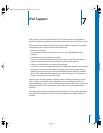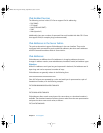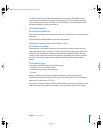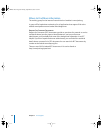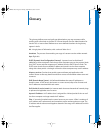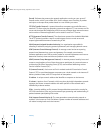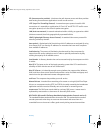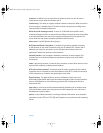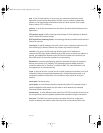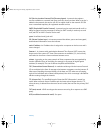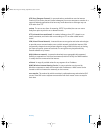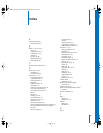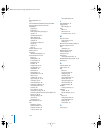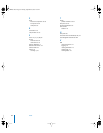
Glossary 91
port A sort of virtual mail slot. A server uses port numbers to determine which
application should receive data packets. Firewalls use port numbers to determine
whether or not data packets are allowed to traverse a local network. “Port” usually
refers to either a TCP or UDP port.
protocol A set of rules that determines how data is sent back and forth between two
applications.
PTR (pointer) record A DNS record type that translates IP (IPv4) addresses to domain
names. Used in DNS reverse lookups.
QTSS (QuickTime Streaming Server) A technology that lets you deliver media over the
Internet in real time.
record type A specific category of records, such as users, computers, and mounts. For
each record type, a directory domain may contain any number of records.
recursion The process of fully resolving domain names into IP addresses. A
nonrecursive DNS query allows referrals to other DNS servers to resolve the address. In
general, user applications depend on the DNS server to perform this function, but
other DNS servers do not have to perform a recursive query.
Rendezvous A protocol developed by Apple for automatic discovery of computers,
devices, and services on IP networks. This proposed Internet standard protocol is
sometimes referred to as “ZeroConf” or “multicast DNS.” For more information, visit
www.apple.com or www.zeroconf.org.
scope A group of services. A scope can be a logical grouping of computers, such as all
computers used by the production department, or a physical grouping, such as all
computers located on the first floor. You can define a scope as part or all of your
network.
search path See search policy.
search policy A list of directory domains searched by a Mac OS X computer when it
needs configuration information; also the order in which domains are searched.
Sometimes called a search path.
shared secret A value defined at each node of an L2TP VPN connection that serves as
the encryption key seed to negotiate authentication and data transport connections.
slave zone The DNS zone records held by a secondary DNS server. A slave zone
receives its data by zone transfers from the master zone on the primary DNS server.
LL2351.Book Page 91 Monday, September 8, 2003 2:47 PM




